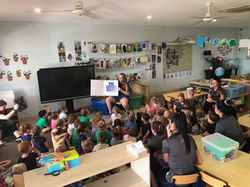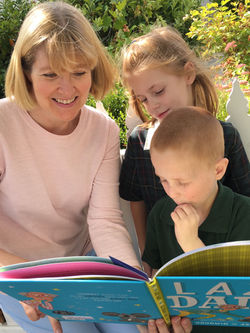
The background to International Read to Me! Day March 19
We have witnessed first-hand the improvements in a child's self efficacy, their increase interest in literacy, and their connection with the community - all through the production of their own books. Child Writes and now the Child Writes Fund has been beating the drum for improvements with children’s literacy over the last decade, and even with the incredible work from many organisations, we felt there was still room to contribute what we could to improving literacy outcomes for children around the world.
"No matter what else we tested for the results show that being read to remains an important factor that is not explained away by other factors such as the parents’ education. Children of 4 or 5 years old who are read to 3-4 times a week have reading ages 6 months ahead of children read to once or twice a week. Reading to children nearly every day almost doubles their progress to one year ahead of the group."
Professor Guyonne Kalb, Melbourne Institute of Applied Economics and Social Research,
“Children’s knowledge of phonics rules is not related to how well they do on tests of real reading, tests in which they have to understand what they read. To do well on reading tests, children need to do a lot of pleasure reading."
Professor Emeritus, Stephen Krashen University of Southern California, USA
There are already incredible organisations; like the Australian Literacy and Numeracy Foundation, Room to Read, the Indigenous Literacy Foundation, National Simultaneous Storytelling, who also focus on improving the literacy standards across the community.
So what is missing? Maybe it's the voices, and therefore the contribution of children?
It is a child’s right to be safe, to be housed, clothed and fed. We say it is also their right to be educated. This means it is also their right to learn how to read, and this means being read to.
We intend on leading INTERNATIONAL READ TO ME DAY – March 19th, every year, giving children the megaphone they need so they demand to be read to regularly!
We respect our children if we listen to our children.
If we respect our children, we protect our children.
Reading to our children
Listening to children
Hearing our children
Protection our children
Why we don't read to our children
1. Exhausted parents / carers
2. Inability to read themselves or no books available in the home
3. Parents too busy with the nighttime routine
4. Shift workers – and mismatched routines
5. Other family members demanding of what little time is spare
This is by no means a definitive list, but it is realistic. The most dedicated parents / carers in the world will not have a 100% reading rate – routines buckle,
time constrains are a truism, and sometimes, you just don’t feel like it.
After all, parents are human too.
If a child comes to school and says:
‘Everyone was too tired’
‘We don’t have any books at home’
‘It was so busy at home last night’
‘My father works nights’
‘My baby brother was crying’
Then we can help fill in the gap the next day. After all, it takes a village to raise a child!
Empowering Children to take the initiative…
We want children to understand they can ask to be read to.
Picture this: a classroom teacher asks ‘Who read to you last night?’ and there are various responses from classmates, ‘My mother / my brother / my aunt / the lady next door / no-one!’ The teacher can then identify those children who may have their reading buddy (a senior) / a school volunteer to visit them in the classroom during the day to read to them.
YOU CAN HELP...
Simply share an image of you reading to a child on March 19th on your preferred social media platform #readtomeday #loveofreading, reminding your peers that it is a really fabulous thing to do.

 |  |  |
|---|---|---|
 |  |  |
